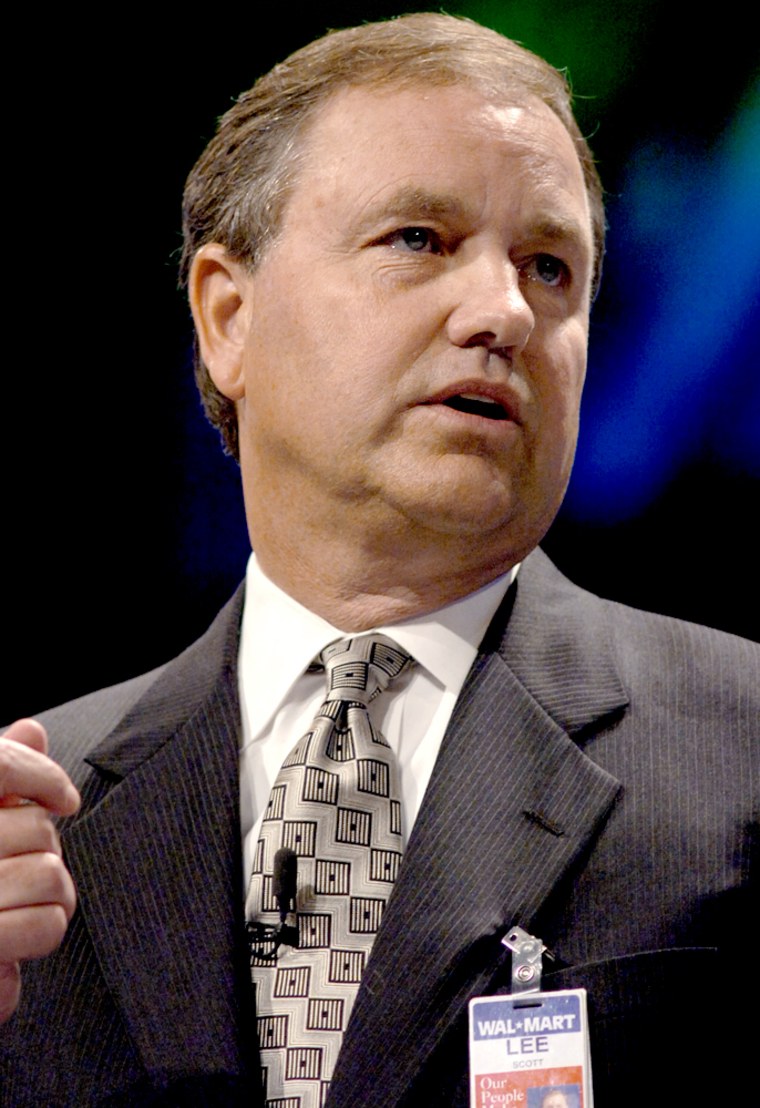Wal-Mart Stores Inc. has unveiled an environmental plan to boost energy efficiency, cut down on waste and reduce greenhouse gases tied to global warming as part of a wider effort to address issues where it has been pummeled by critics.
Wal-Mart Chief Executive Lee Scott said the world’s largest retailer wants to be a “good steward for the environment” and ultimately use only renewable energy sources and produce zero waste.
“As one of the largest companies in the world, with an expanding global presence, environmental problems are our problems,” Scott said in a transcript, released Tuesday, of a speech he gave Monday to employees titled “21st Century Leadership”.
Targets include spending $500 million a year to: increase fuel efficiency in Wal-Mart’s truck fleet by 25 percent over three years and doubling it within 10 years; reduce greenhouse gases by 20 percent in seven years; reduce energy use at stores by 30 percent; and cut solid waste from U.S. stores and Sam’s Clubs by 25 percent in three years.
He said improving fuel mileage in the trucking fleet by one mile per gallon would save more than $52 million per year. The company also aims to cut energy usage at its stores by 30 percent.
Wal-Mart recently opened an experimental store in McKinney, Texas, to study environmental efforts such as heating the store with used cooking and motor oil. Scott said the savings so far were not enough to cover the cost of building the store, but that it may be economically feasible if Wal-Mart takes advantage of its size and rolls out such changes across the chain.
Scott said the plan was part of goals set after a year of talks with Wal-Mart’s employees, suppliers, critics and customers that he said showed many of the issues where the company was on the defensive could be opportunities instead.
The speech follows a volley of announcements by Wal-Mart since last week outlining responses to critics on issues such as pay, and comes ahead of a two day annual conference for financial analysts who follow the retailer.
Activists react
One Wal-Mart critic dismissed the green targets as a diversion, saying Wal-Mart has declined to raise wages that labor groups and others criticize as being at or below the poverty level.
“They are digging in their heels over wages,” said Tracy Stefl from Wal-Mart Watch, a coalition of union, environmental and women’s rights groups and other activists.
“Wal-Mart seems rightly sincere in their efforts to be the best company they can be. So to completely dismiss the notion of raising wages for its workers constitutes a failure of their goals,” Stefl said.
The Sierra Club, for its part, welcomed the news but added a caveat.
“Wal-Mart's new commitments to increase efficiency and reduce pollution and waste are important first steps for a company that has such a profound impact on our environment,” Director Carl Pope said in a statement.
“While this announcement shows that Wal-Mart can be leader, it also demonstrates that they should be able to take equal steps to protect workers,” he added. “Wal-Mart should also include in their plans an effort to more responsibly site their stores, obey our nation's clean water laws, which have been violated in the past, and address community concerns at all of their locations.”
Consultant’s view
Tom Rubel, who heads consultant Retail Forward in Columbus, Ohio, said Scott was marking a new start for Wal-Mart after recognizing that being green was good both for the environment and for business.
“I do think that this is a departure. This is sort of vintage Wal-Mart. They have listened, and learned, and now they have set a course and they’ve established some aggressive goals and now they’re going to go after it very aggressively,” Rubel said.
In a world of high energy prices, cutting fuel use and raising efficiency at stores would take costs out of the Wal-Mart supply chain that would make it more competitive and better able to offer low prices, Rubel said.
“This is all good stuff, but it is also good business,” he said.
Scott on Tuesday also outlined plans to boost diversity among Wal-Mart’s more than 60,000 suppliers and in its work force, which numbers 1.2 million in the United States, as well as to work toward independent monitoring of its overseas suppliers to make sure they meet social and environmental standards, both points first raised by Scott last week.
Scott also detailed a lower-premium health care plan aimed at making coverage more affordable to Wal-Mart workers. Fewer than half of Wal-Mart’s employees are covered by the company health care plan, compared to 80 percent at rival Costco Wholesale Corp.
